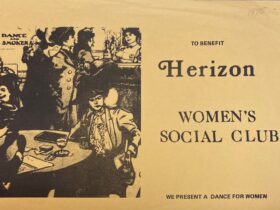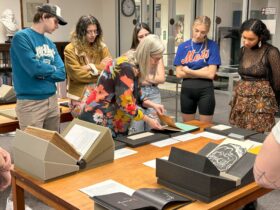
Pulitzer Prize-winning historian and sociologist Herbert P. Bix delivered his final lecture as a Binghamton University faculty member to a room filled to capacity with colleagues and former students on Nov. 1. True to the introduction given by John Chaffee on his fellow professor’s endless enthusiasm, the retiring Bix devoted his talk to research of the present, rather than reflection of the past.
Bix first arrived on campus in 1988 as a visiting associate professor to the history department. After this year-long engagement ended, Bix wouldn’t return to Binghamton until 2001, when he became a permanent faculty member. He is best known for his book Hirohito and the Making of Modern Japan, which won the Pulitzer Prize and the National Book Critics Circle Award in 2001. The book – and an entire career marked by new arguments and conclusions – makes Bix worthy of praise, Chaffee said.
“This book caused a major stir when it first came out, and to my mind it’s particularly noteworthy for its eminently human portrayal of Emperor Hirohito, and specifically for his well-documented contention that Hirohito was not simply a figurehead, but an active participant in wartime activities,” Chaffee said. “This is something that had not been suggested in any comparably scholarly way by any other research.”
The accolades for this book hardly marked the end point for Bix’s career. His more recent research has dealt at great length with the Tokyo War Crimes Trials and issues of international law. Bix has also increasingly turned to his newer role as a public intellectual – an analyst of international relations, and a critic of U.S foreign policy and Japan’s post-Fukushima policies. And even in the Institute for Advanced Studies in the Humanities conference room, addressing an event to celebrate his past accomplishments, Bix’s interests were clearly focused on what’s next.
“Let me get right to it,” Bix said. “Here’s a prospectus that I wrote and sent off to publishers looking for a contract. This book concerns political crisis and the growth and consolidation of authoritarian, super-legal state power in two countries.”
Bix’s opening remarks signaled to the audience that the evening would not likely include a discussion about his plans for a quiet retirement. He titled his lecture “Empire Building in America and Japan: The Breakdown of Constitutional Order,” and began an in-depth review of this current work which he hopes will soon result in another published book.
“Imperial Japan’s experience with emergency power tells us much about where America is headed,” Bix said. “Conversely, the behavior of American elites at home and abroad frame particular moments of the 20th and 21st centuries and illuminate overlooked aspects of both Imperial and pacifist Japan.”
Read more here





